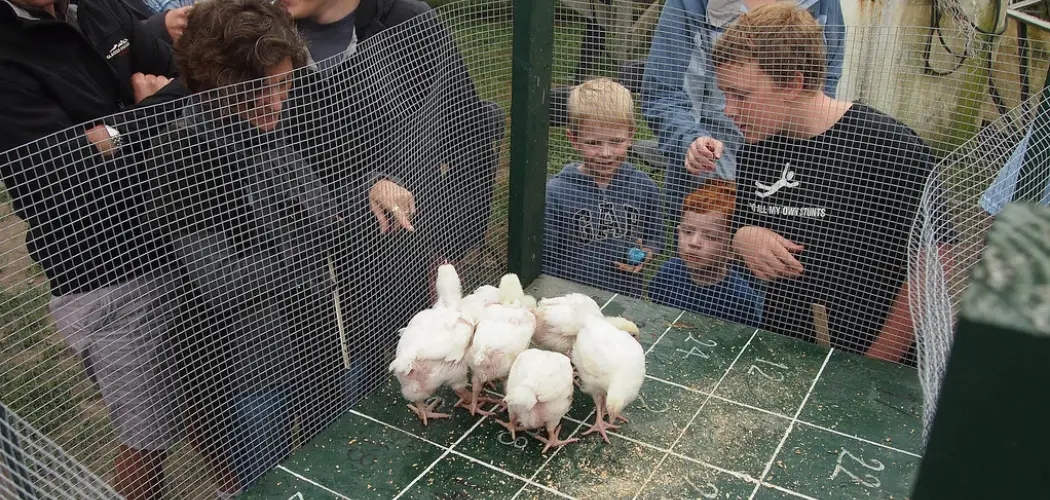Proper waste management is a vital aspect of maintaining a healthy and hygienic environment for your backyard flock. When it comes to raising chickens, effectively disposing of chicken poop is a crucial responsibility. The accumulation of manure not only poses potential health risks to your chickens but also has implications for the surrounding environment.
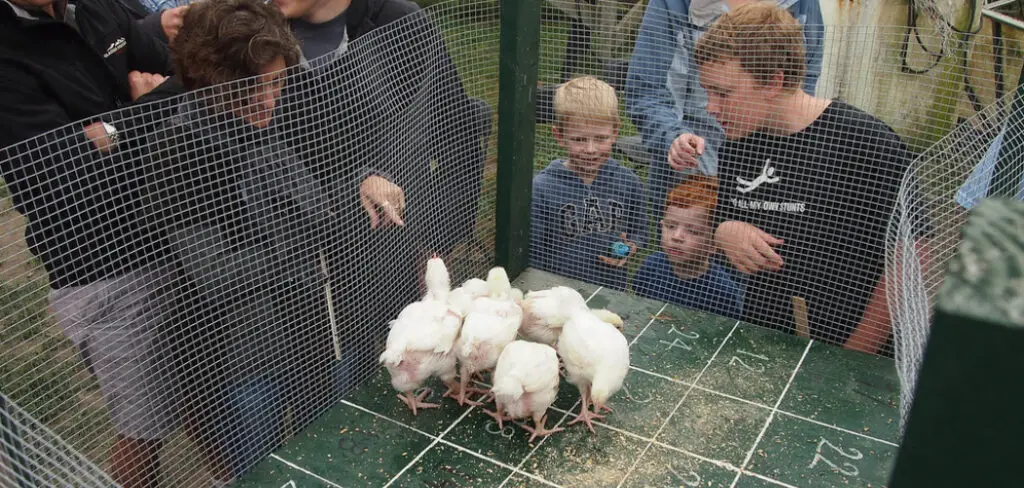
In this guide, we will explore various methods on how to dispose of chicken poop responsibly and efficiently. From composting and utilizing it as fertilizer to exploring innovative approaches such as vermiculture, understanding the best practices for chicken waste disposal ensures a clean and sustainable coop environment while simultaneously harnessing the nutrient-rich qualities of chicken manure for the benefit of your garden or landscaping.
Importance of Proper Disposal of Chicken Poop
The importance of proper disposal of chicken poop cannot be overstated. Left unchecked, accumulated manure can foster the growth of pathogens and parasites, negatively impacting the health of your flock. It can also attract pests, such as flies and rodents, looking for food and breeding grounds, which can further spread disease.
From an environmental standpoint, irresponsible disposal can lead to nutrient runoff into waterways, contributing to issues like eutrophication. Properly managing chicken waste not only mitigates these risks but also turns a potential problem into a valuable resource for soil enrichment.
Benefits of Responsible Waste Management in Poultry Farming
Responsible waste management in poultry farming has multifaceted benefits. It not only promotes the health and well-being of the chickens by providing a clean living environment but also prevents the spread of diseases that could potentially affect humans and other animals.
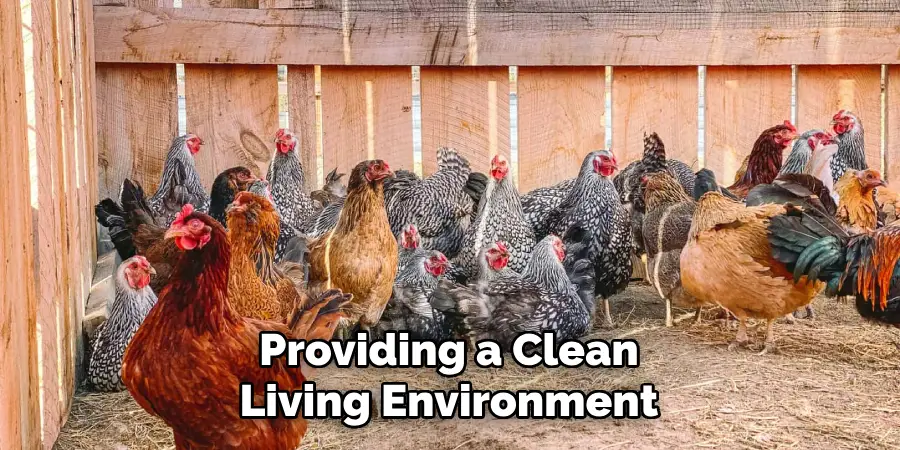
By properly disposing of and treating chicken poop, farmers can diminish the risk of contaminating water sources and soil, which is essential for the sustainability of the local ecosystem.
Additionally, when chicken waste is converted into compost, it transforms into an excellent organic fertilizer, rich in nitrogen, phosphorus, and potassium. This not only reduces the need for chemical fertilizers but also increases the fertility and water retention of the soil, which is beneficial for agricultural purposes.
Implementing such measures not only aligns with environmental stewardship but can also lead to economic savings and potentially create an additional revenue stream, as composted manure can be marketed as a valuable commodity for gardeners and crop producers.
Understanding Chicken Waste
To effectively manage chicken waste, it’s important to understand its composition and how it breaks down over time. Chicken poop primarily consists of nitrogen, phosphorus, and potassium, along with organic matter and microorganisms.
In contrast to the waste of many other animals, chicken manure is particularly high in nitrogen, which, if not managed correctly, can be as harmful as it is beneficial. If left to accumulate, the high nitrogen content can burn plants and contribute to ammonia build-up, which is detrimental to the respiratory health of chickens.
It’s critical, then, to process or treat chicken poop before using it as a fertilizer, ensuring that its nutrient properties are harnessed without causing harm or imbalance in the environment. Understanding these aspects is the first step towards turning waste into a resource in an ethical and sustainable manner.
Composition and Characteristics of Chicken Poop
Chicken poop is composed of a variety of elements that reflect the diet and health of the chickens. On average, their manure contains about 1.1% nitrogen (\(N\)), 0.8% phosphorus (\(P_2O_5\)), and 0.5% potassium (\(K_2O\)), making it a potent fertilizer when used correctly.
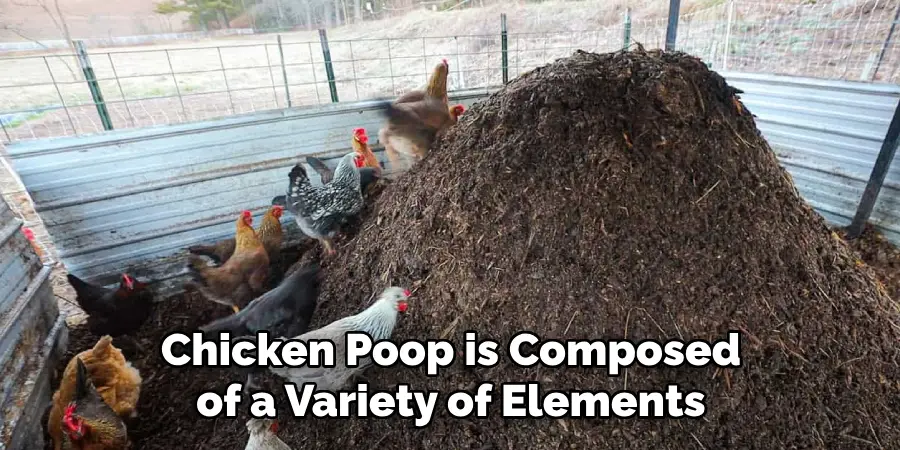
The consistency and moisture levels of chicken poop can vary but it often has a higher moisture content compared to the waste of other livestock. Besides macro-nutrients, it also contains micro-nutrients such as calcium, magnesium, and sulfur, which are vital for plant growth.
However, its raw state can be problematic due to the presence of bacteria like Salmonella and E. coli, as well as parasites. The high nitrogen content, particularly in the form of ammonia, can be toxic to plants and animals if not properly treated.
As such, understanding the specific makeup and the potential challenges of using chicken manure is fundamental for effective waste management and utilization as a soil amendment.
10 Methods How to Dispose of Chicken Poop
1. Composting:
Composting chicken poop is an excellent method that transforms waste into nutrient-rich fertilizer. Create a designated compost pile, combining chicken manure with carbon-rich materials like straw, leaves, and kitchen scraps.
Turn the compost regularly to facilitate decomposition, and after a few months, you’ll have a potent organic fertilizer for your garden. However, there are a few things to keep in mind while composting chicken poop. To avoid any potential health risks, make sure to wear gloves and protective gear while handling chicken manure. It’s also essential to maintain the correct ratio of carbon to nitrogen (C:N) in the compost pile.
The C:N ratio is crucial because it determines the rate of decomposition and the quality of the resulting fertilizer. The ideal C:N ratio for composting chicken poop is around 20:1. If the pile is too high in nitrogen, it can become smelly and attract pests. On the other hand, if there is not enough nitrogen, the decomposition process will be slow, and you won’t get a rich fertilizer. To maintain the proper C:N ratio, mix equal parts of chicken manure with carbon-rich materials.
2. Deep Litter Method:
The deep litter method involves allowing chicken bedding, including manure, to accumulate over time. This creates a composting bedding layer that generates heat, promoting the breakdown of waste. Periodically add fresh bedding and turn the litter to maintain optimal conditions. When the litter reaches a suitable depth, it can be removed and added to the compost pile.
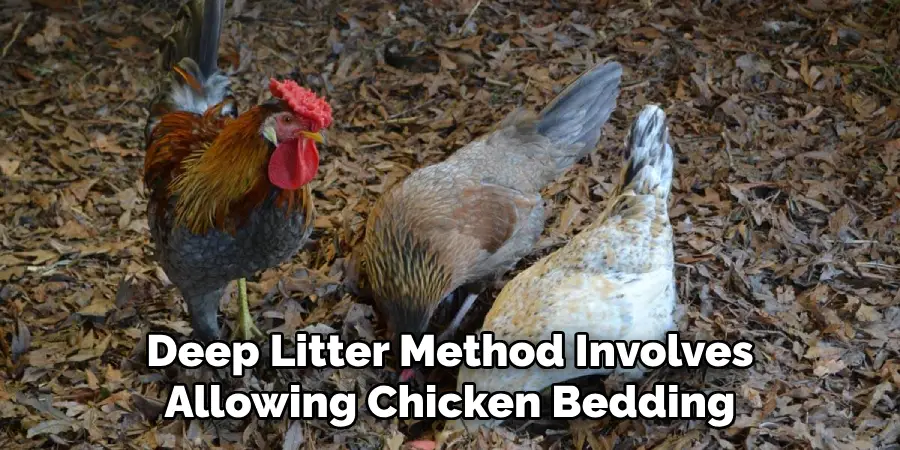
The deep litter method is a popular option for managing chicken bedding, as it offers several benefits. Not only does it help reduce the amount of waste generated, but it also creates a warm and comfortable environment for your chickens.
One of the main advantages of using the deep litter method is that it requires less maintenance compared to other bedding options. Since you are not constantly cleaning out the coop, you save both time and effort. This method is also cost-effective, as you do not need to purchase new bedding materials frequently.
3. Vermicomposting:
Integrate worms into your waste management strategy through vermiculture. Worms, particularly red wigglers, consume organic matter, including chicken manure, turning it into nutrient-rich vermicompost. Set up a dedicated worm bin with appropriate bedding, add chicken waste, and let the worms work their magic. The resulting vermicompost is a valuable soil amendment.
Vermicomposting is a sustainable and effective way to manage organic waste. Not only does it reduce the amount of waste sent to landfills, but it also produces a valuable resource for gardening and farming. In this section, we will discuss the benefits of vermicomposting, how to set up a worm bin, and tips for maintaining a successful vermicomposting system.
4. Mulching:
Utilize chicken poop as a natural mulch for your garden. Apply a thin layer around plants to suppress weeds, retain soil moisture, and slowly release nutrients into the soil. Ensure the manure is well-aged or composted to prevent burning plants due to high nitrogen levels. Mulching not only improves soil structure but also enhances its fertility over time.
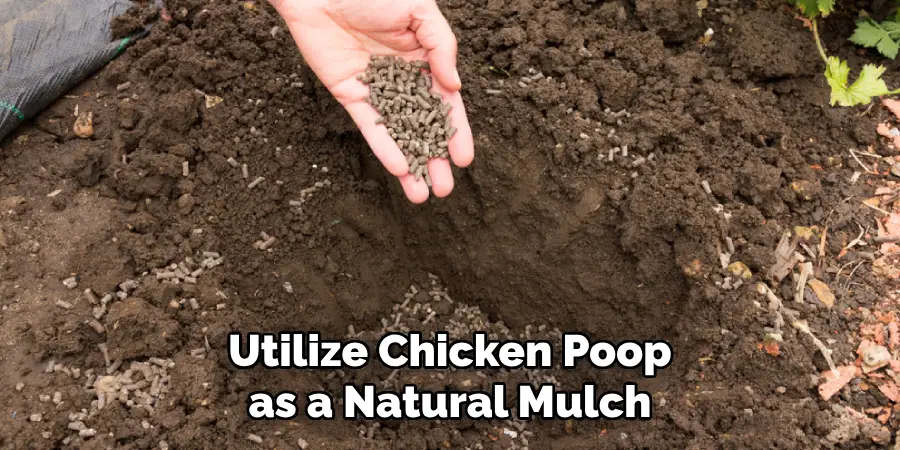
Mulching is an essential practice for maintaining a healthy garden. It involves covering the soil with a layer of material to improve its overall quality and protect it from external factors. While there are various types of mulch available, utilizing chicken poop as a natural mulch can provide significant benefits.
One of the primary advantages of using chicken poop as mulch is its ability to suppress weeds. The thick layer of manure blocks out sunlight, preventing weed seeds from germinating and growing. This reduces the need for manual weeding or chemical herbicides, making it an environmentally-friendly option.
5. Manure Tea:
Create a nutrient-rich liquid fertilizer by making manure tea. Place chicken manure in a porous bag or container and steep it in water for several days. The resulting liquid can be diluted and used to water plants, providing a boost of nutrients.
Regularly aerate the tea during the steeping process to enhance its efficacy. This method can also be used with other types of manure, such as cow or horse manure. While manure tea is a natural and cost-effective fertilizer, it should be used sparingly as too much can harm plants.
Manure tea is a great way to provide organic nutrients to your plants. It contains essential macronutrients such as nitrogen, phosphorus, and potassium, as well as micronutrients like calcium and magnesium.
These nutrients are vital for plant growth and development, and manure tea can help supplement the soil’s existing nutrient levels. This method is particularly useful for organic gardening, as it avoids the use of synthetic fertilizers that can harm both plants and the environment.
Manure tea also improves soil structure by increasing its water retention capacity and promoting beneficial microbial activity. As the tea decomposes, it releases humic acid, which helps bind soil particles together, creating a more stable and fertile growing medium. This can be especially beneficial for sandy soils that are prone to water runoff and nutrient leaching.
6. Biogas Production:
Consider more advanced waste management solutions by exploring biogas production. Anaerobic digestion systems can convert chicken manure into biogas, a renewable energy source. While this method requires more complex infrastructure, it offers the dual benefits of waste disposal and energy generation.
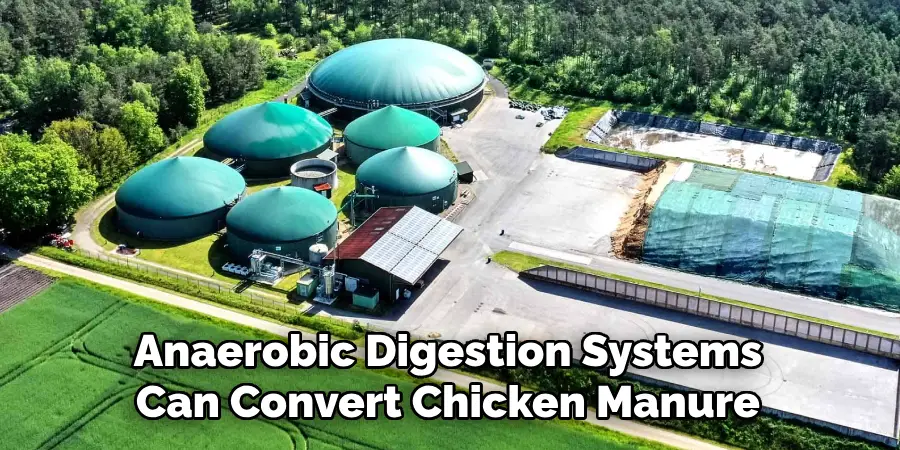
Biogas production is a process that can greatly benefit the environment and reduce dependency on fossil fuels. Biogas is produced through anaerobic digestion, which involves breaking down organic material without oxygen to produce methane gas. This methane gas can then be used as a renewable energy source for heating, cooking, and electricity.
One of the main advantages of biogas production is its ability to reduce methane emissions from organic waste. Methane is a potent greenhouse gas that contributes to climate change, and landfills are one of the largest sources of methane emissions. By diverting organic waste from landfills into biogas production systems, we can greatly reduce our carbon footprint.
7. Incorporation into Livestock Bedding:
If you raise other livestock such as goats or cows, consider using chicken manure as part of their bedding material. The combination of different animal wastes contributes to the creation of a beneficial composting bedding layer.
Regularly turning and adding fresh bedding will help manage waste and provide a comfortable environment for your animals. This can also improve the quality of manure produced, making it a valuable addition to your garden or crop fields.
Using chicken manure in livestock bedding has several benefits. It helps absorb moisture and odors, reducing the risk of respiratory issues for your animals. The high nitrogen content in chicken manure also promotes healthy plant growth when used as compost in gardening or farming.
8. Direct Application to Pasture:
For those with free-range chickens or access to a larger outdoor area, allowing chickens to roam on pasture can aid in natural waste dispersion. The manure deposited directly on the pasture contributes to soil fertility, supporting the growth of grasses and other vegetation. Additionally, chickens can help control pests and reduce the need for pesticides or herbicides.
It is important to note that while chickens can provide beneficial ecological services when allowed to roam on pasture, careful management is still necessary.
Overgrazing and over-foraging can occur if too many chickens are kept in a small space, leading to decreased vegetation growth and soil degradation. Providing adequate space and rotating chickens to different areas of pasture can help prevent these issues. Additionally, daily monitoring and management of the flock is crucial to ensure their health and wellbeing on pasture.
9. Rendering for Fertilizer Production:
Explore partnerships with local rendering or fertilizer production facilities. Some facilities may accept chicken manure for processing into commercial fertilizers. This method not only provides an avenue for responsible waste disposal but also contributes to the production of valuable agricultural inputs.
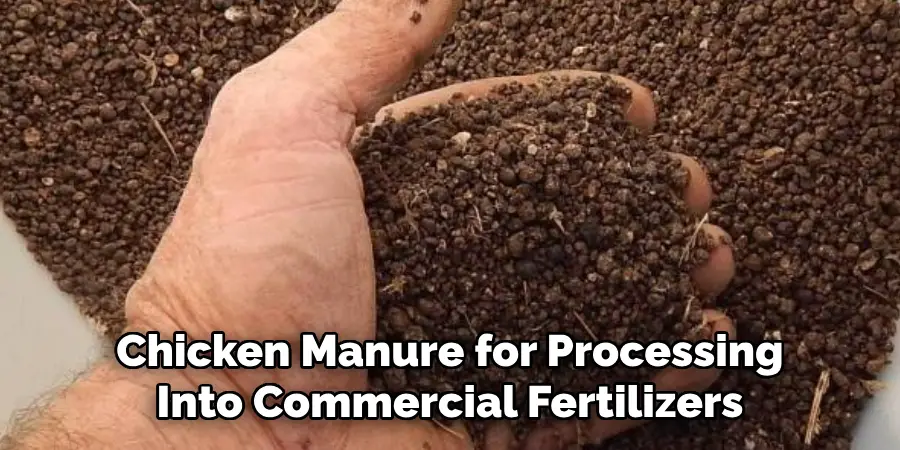
By partnering with rendering or fertilizer production facilities, chicken farmers can benefit in multiple ways. Not only does it provide a responsible waste disposal solution for the excess manure produced on their farms, but it also contributes to the production of valuable agricultural inputs.
Rendering facilities use heat and pressure to convert animal by-products into useful materials such as protein meal and tallow. These processed products can then be used as ingredients in animal feed, pet food, soap, and even biofuels.
10. Consult with Local Agricultural Extension Services:
Local agricultural extension services can offer guidance on region-specific best practices for chicken manure disposal. They may provide information on local regulations, guidelines, and initiatives for sustainable waste management. This approach ensures compliance with local standards while promoting environmentally friendly practices.
Extension services can also help identify potential alternative uses of chicken manure, such as composting and biogas production, which can reduce waste volumes and provide additional value to farmers. Additionally, they may offer training programs on proper disposal techniques and resources for managing chicken manure efficiently.
Consulting with local agricultural extension services is also beneficial in terms of networking and building relationships within the farming community. Extension services can connect farmers to resources and support networks, such as cooperatives or farmer associations, which can provide additional knowledge and expertise on chicken manure disposal.
Potential Risks and Challenges of Improper Disposal
Improper disposal of chicken poop presents several risks and challenges that can have lasting negative impacts on health and the environment. One significant risk is the contamination of water sources, which can stem from runoff during rainfall, carrying pathogens and nutrients into streams, rivers, and groundwater.
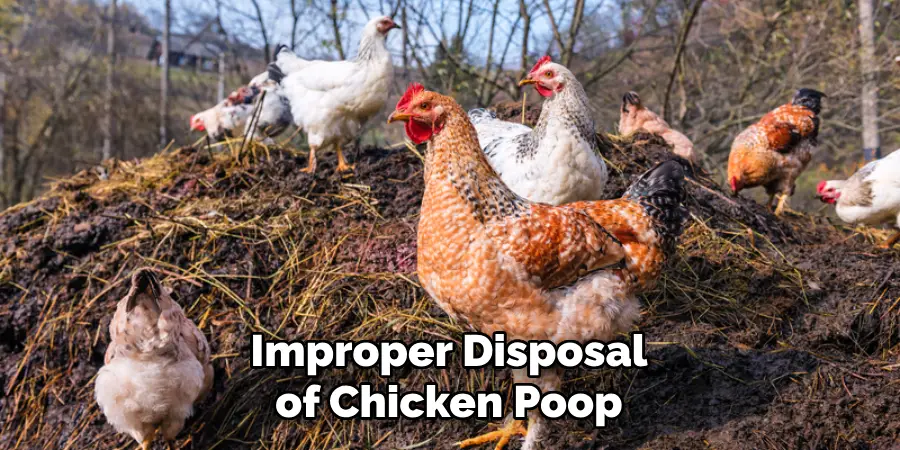
This can cause algal blooms, which deplete oxygen in the water and harm aquatic life—a phenomenon known as eutrophication.
Another challenge is the detrimental effect on soil health. Excessive application of raw chicken manure can lead to nutrient overload, particularly nitrogen, which can burn plants and inhibit their growth. It can also alter soil pH and microbiology, negatively affecting its structure and fertility.
Additionally, improperly managed chicken poop can become a breeding ground for flies, rodents, and other pests, which not only pose a nuisance but are also vectors for disease.
The spread of pathogens such as Salmonella and E. coli is a serious concern for both animal and human health, with potential for food safety issues if crops are contaminated.
To mitigate these risks, it is imperative that poultry farmers employ responsible waste management practices which include proper treatment and utilization of chicken manure to ensure the protection of the environment and public health.
Conclusion
In conclusion, effective disposal of chicken poop is not only a matter of responsible waste management but also an opportunity to harness valuable nutrients for the benefit of your garden or agricultural ventures. The diverse methods discussed, from composting and vermiculture to mulching and biogas production, offer adaptable solutions suitable for various scales of poultry operations.
By incorporating these waste management practices, not only do you maintain a clean and hygienic coop environment, but you also contribute to sustainable and eco-friendly practices. Thanks for reading, and we hope this has given you some inspiration on how to dispose of chicken poop!
About
Outdoor Fixes is a distinguished figure in the world of Diy design, with a decade of expertise creating innovative and sustainable Diy solutions.
His professional focus lies in merging traditional craftsmanship with modern manufacturing techniques,
fostering designs that are both practical and environmentally conscious. As the author of diy,
outdoorfixes delves into the art and science of outdoorfixes-making, inspiring artisans and industry professionals alike.
Education RMIT University
(Melbourne, Australia) Associate Degree in Design (Outdoor Fixes) Focus on sustainable design, industry-driven projects,
and practical craftsmanship. Gained hands-on experience with traditional and digital manufacturing tools, such as CAD and CNC software.
Nottingham Trent University
(United Kingdom) Bachelor’s in outdoorfixes.com and Product Design (Honors) Specialized in product design with a focus on blending creativity with production
techniques. Participated in industry projects, working with companies like John Lewis and Vitsoe to gain real-world insights.
Publications and Impact
In diy, Outdoor Fixes his insights on indoor design processes, materials, and strategies for efficient production.
His writing bridges the gap between artisan knowledge and modern industry needs, making it a must-read for both budding designers and seasoned professionals.

